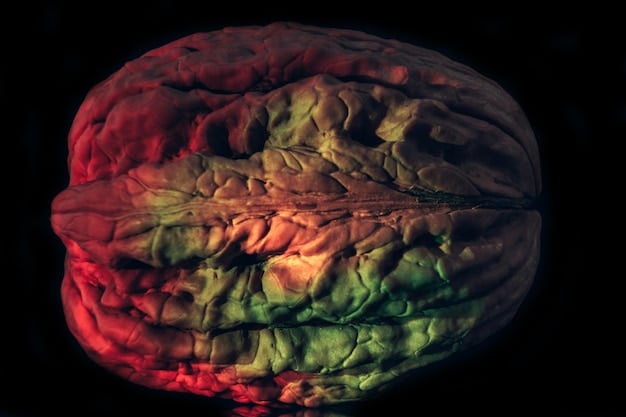Unlock Your Memory Potential: Simple Techniques to Boost Recall

Anúncios
Unlock the Secrets of Memory Improvement: Simple Techniques to Boost Your Recall by employing strategies like spaced repetition, mnemonic devices, and a healthy lifestyle to enhance cognitive functions and overall memory capacity.
Ever find yourself forgetting where you put your keys or struggling to remember names? You’re not alone. **Unlock the Secrets of Memory Improvement: Simple Techniques to Boost Your Recall** is within reach, and this guide will walk you through practical strategies to sharpen your mind and enhance your memory.
Anúncios
Understanding the Foundations of Memory Improvement
Improving memory isn’t just about memorizing facts; it’s about understanding how your memory works and making simple lifestyle adjustments. It’s about creating habits that naturally boost your brainpower.
Before diving into the techniques, it’s crucial to understand the basic types of memory and how they function. Knowing this can help you tailor your improvement strategies to your specific needs.
Anúncios
Types of Memory
Understanding the different types of memory is the first step in targeting specific areas for improvement. Here are the core memory types you should know:
- Sensory Memory: This includes your immediate sensory experiences, like seeing a flash of light or hearing a loud noise. It’s very brief, lasting only a few seconds.
- Short-Term Memory: Also known as working memory, this holds information temporarily – for instance, a phone number you just heard. It lasts about 20-30 seconds without active maintenance.
- Long-Term Memory: This holds information for the long haul. It can be declarative (facts and events) or non-declarative (skills and habits).
Each type of memory serves a distinct purpose, and improvements in one area can positively influence the others. Knowing this interplay can guide your efforts for overall cognitive enhancement.
Effective Mnemonic Techniques for Enhanced Recall
Mnemonic techniques are memory aids that use imagery, association, and other tricks to make information more memorable. They’re a powerful way to boost your recall for specific details.
Mnemonic devices can transform mundane facts into memorable experiences. Here are some popular mnemonic techniques you can start using today:
The Acronym Technique
This involves creating a memorable word or phrase from the first letters of a list of items. For example, “ROY G. BIV” helps remember the colors of the rainbow.
The Story Method
Turn the information you want to remember into a story. Humans are naturally wired to remember narratives, making this technique highly effective.
- Visualize the Story: Create vivid mental images to make the story more engaging.
- Add Emotion: Emotional content tends to be more memorable.
- Make it Absurd: The more bizarre the story, the easier it will be to remember.
By using mnemonic techniques, you can dramatically improve your ability to recall information, whether it’s a shopping list or a presentation outline.
Spaced Repetition: The Science-Backed Memory Booster
Spaced repetition involves reviewing information at increasing intervals. This technique is based on the forgetting curve, which shows that we forget information rapidly if we don’t revisit it.
Spaced repetition isn’t just about reviewing; it’s about timing your reviews to coincide with when you’re most likely to forget. This maximizes retention with minimal effort.
How Spaced Repetition Works
The core principle is simple: review information just before you’re about to forget it. This strengthens the memory trace.
Tools for Spaced Repetition
Several apps and software programs are designed specifically for spaced repetition. These tools automate the scheduling process, making it easier to implement the technique.
- Anki: A popular and highly customizable flashcard program.
- Memrise: A language learning platform that incorporates spaced repetition.
- SuperMemo: One of the earliest spaced repetition systems, known for its advanced algorithms.
Spaced repetition isn’t just for students; it’s a valuable tool for anyone who wants to retain information effectively over the long term.
Lifestyle Adjustments for Long-Term Memory Health
While specific techniques can improve recall, your overall lifestyle plays a crucial role in long-term memory health. Factors like diet, exercise, and sleep have a profound impact on cognitive function.
Improving your memory isn’t just about using tricks; it’s about adopting habits that support a healthy brain. Here’s how to optimize your lifestyle for better memory:
The Role of Diet
A diet rich in antioxidants, healthy fats, and essential nutrients can protect your brain from damage and enhance cognitive function. Foods like blueberries, salmon, and leafy greens are particularly beneficial.
The Importance of Sleep
Sleep is essential for memory consolidation. During sleep, your brain processes and stores information, transferring it from short-term to long-term memory.
- Aim for 7-9 Hours: Most adults need at least seven hours of sleep per night.
- Establish a Routine: Consistent sleep patterns improve sleep quality.
- Create a Sleep-Friendly Environment: Make sure your bedroom is dark, quiet, and cool.
By making smart lifestyle choices, you can create a foundation for long-term memory health and cognitive well-being.
Mindfulness and Meditation for Focus and Memory
Mindfulness and meditation practices have been shown to improve focus, reduce stress, and enhance memory. By learning to be present in the moment, you can improve your ability to encode and recall information.
In today’s fast-paced world, it’s easy to become distracted. Mindfulness and meditation offer a way to train your attention and improve your cognitive function.
Benefits of Mindfulness
Mindfulness involves paying attention to your thoughts, feelings, and sensations in the present moment without judgment. This practice can reduce mind-wandering and improve focus.
Meditation Techniques for Memory
There are many different types of meditation, but some are particularly effective for improving memory. Here are a few to try:
- Mindfulness Meditation: Focus on your breath and observe your thoughts without getting carried away.
- Loving-Kindness Meditation: Cultivate feelings of compassion and kindness towards yourself and others.
- Visualization Meditation: Visualize scenes or objects to enhance memory and creativity.
By incorporating mindfulness and meditation into your daily routine, you can improve your focus, reduce stress, and enhance your memory.
The Power of Association and Visualization
Association and visualization are powerful techniques for encoding information in a memorable way. By linking new information to existing knowledge and creating vivid mental images, you can significantly improve recall.
These techniques tap into your brain’s natural ability to create connections and remember visual information. Here’s how to use them effectively:
Using the Association Technique
Link new information to something you already know. The more unusual or personal the connection, the more memorable it will be.
The Benefits of Visualization
Creating mental images is a highly effective way to encode information. The more detailed and vivid the image, the easier it will be to recall.
- Engage Your Senses: Involve all your senses in the visualization.
- Add Movement: Dynamic images are more memorable than static ones.
- Make it Personal: Relate the image to your own experiences and emotions.
By harnessing the power of association and visualization, you can transform mundane facts into memorable experiences and improve your overall recall ability.
| Key Point | Brief Description |
|---|---|
| 🧠 Mnemonic Devices | Use acronyms, rhymes, or stories to remember information easily. |
| 🗓️ Spaced Repetition | Review information at increasing intervals to strengthen memory retention. |
| 🍎 Healthy Lifestyle | Maintain a balanced diet, exercise regularly, and prioritize sleep for optimal brain health. |
| 🧘 Mindfulness | Practice mindfulness and meditation to improve focus and reduce cognitive distractions. |
Frequently Asked Questions
▼
Start by incorporating mnemonic devices into your routine, such as creating acronyms for lists. Regularly engage in mentally stimulating activities like puzzles or reading, and ensure you get enough sleep to aid memory consolidation.
▼
A diet rich in antioxidants, omega-3 fatty acids, and nutrients supports brain health. Incorporate foods like blueberries, salmon, and leafy greens to protect against cognitive decline and improve memory function.
▼
Yes! Regular physical activity increases blood flow to the brain, promoting the growth of new neurons and strengthening neural connections. Aim for at least 30 minutes of moderate exercise most days of the week.
▼
Spaced repetition involves reviewing information at increasing intervals. Start by reviewing new material shortly after learning it, then gradually increase the time between reviews. Tools like Anki can automate this process.
▼
While age-related memory loss is common, adopting healthy lifestyle habits and cognitive training can mitigate its effects. Early intervention and consistent effort can help maintain and even improve cognitive function.
Conclusion
Improving your memory is an ongoing process that requires consistent effort and a combination of strategies. By incorporating mnemonic techniques, spaced repetition, lifestyle adjustments, mindfulness, and the power of association and visualization, you can **unlock the secrets of memory improvement** and significantly boost your recall abilities. Start small, stay consistent, and enjoy the benefits of a sharper, more focused mind.







